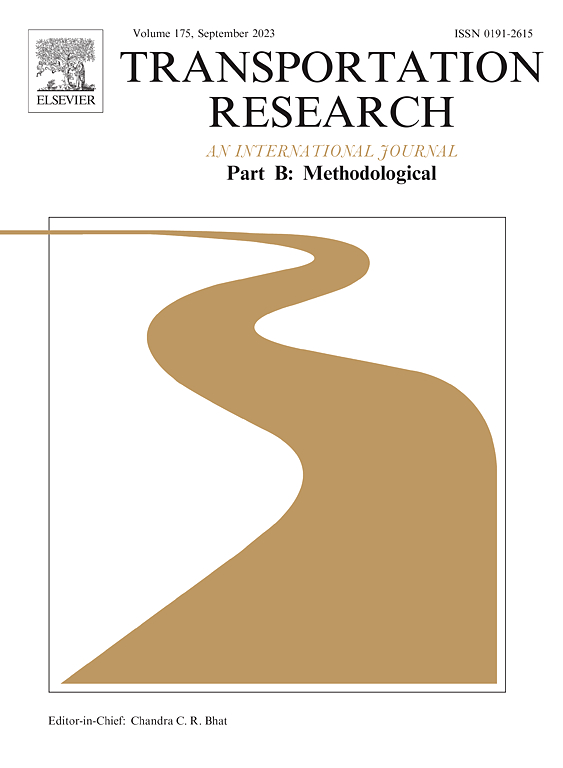A contextual framework for learning routing experiences in last-mile delivery
IF 6.3
1区 工程技术
Q1 ECONOMICS
引用次数: 0
Abstract
This paper presents a contextual framework for solving the experience-driven traveling salesman problem in last-mile delivery. The objective of the framework is to generate routes similar to historic high-quality ones as classified by operational experts by considering the unstructured and complex features of the last-mile delivery operations. The framework involves learning a transition weight matrix and using it in a TSP solver to generate high quality routes. In order to learn this matrix, we use descriptive analytics to extract and select important features of the high-quality routes from the data. We present a rule-based method using such extracted features. We then introduce a factorization of the transition weight matrix by features, which reduces the dimensions of the information to be learned. In the predictive analytics stage, we develop (1) Score Guided Coordinate Search as a derivative-free optimization algorithm, and (2) label-guided methods inspired by supervised learning algorithms for learning the routing preferences from the data. Any hidden preferences that are not obtained in the descriptive analytics are captured at this stage. Our approach allows us to blend the advantages of different facets of data science in a single collaborative framework, which is effective in generating high-quality solutions for a last-mile delivery problem. We test the efficiency of the methods using a case study based on Amazon Last-Mile Routing Challenge organized in 2021. A preliminary version of our rule-based method received the third place and a $25,000 award in the challenge. In this paper, we improve the learning performance of our previous methods through predictive analytics, while ensuring that the methods are effective, interpretable and flexible. Our best performing algorithm improves the performance of our rule-based method on an out-of-sample testing dataset by more than 23.1%.
一个上下文框架,用于学习最后一英里交付中的路由经验
本文提出了一个解决最后一英里配送中体验驱动的旅行商问题的上下文框架。该框架的目标是通过考虑最后一英里交付操作的非结构化和复杂特征,生成与历史上高质量的路线相似的路线。该框架包括学习一个过渡权矩阵,并将其用于TSP求解器以生成高质量的路线。为了学习这个矩阵,我们使用描述性分析从数据中提取和选择高质量路线的重要特征。我们提出了一种基于规则的方法。然后,我们引入了转换权矩阵的特征分解,这减少了要学习的信息的维数。在预测分析阶段,我们开发了(1)分数引导坐标搜索(Score Guided Coordinate Search)作为一种无导数的优化算法,以及(2)受监督学习算法启发的标签引导方法,用于从数据中学习路由偏好。在此阶段捕获描述性分析中未获得的任何隐藏首选项。我们的方法使我们能够将数据科学的不同方面的优势融合在一个单一的协作框架中,这对于为最后一英里交付问题生成高质量的解决方案是有效的。我们使用基于2021年组织的亚马逊最后一英里路由挑战的案例研究来测试这些方法的效率。我们基于规则的方法的初步版本在挑战赛中获得了第三名和25,000美元的奖励。在本文中,我们通过预测分析提高了之前方法的学习性能,同时确保了方法的有效性、可解释性和灵活性。我们的最佳算法将基于规则的方法在样本外测试数据集上的性能提高了23.1%以上。
本文章由计算机程序翻译,如有差异,请以英文原文为准。
求助全文
约1分钟内获得全文
求助全文
来源期刊
CiteScore
12.40
自引率
8.80%
发文量
143
审稿时长
14.1 weeks
期刊介绍:
Transportation Research: Part B publishes papers on all methodological aspects of the subject, particularly those that require mathematical analysis. The general theme of the journal is the development and solution of problems that are adequately motivated to deal with important aspects of the design and/or analysis of transportation systems. Areas covered include: traffic flow; design and analysis of transportation networks; control and scheduling; optimization; queuing theory; logistics; supply chains; development and application of statistical, econometric and mathematical models to address transportation problems; cost models; pricing and/or investment; traveler or shipper behavior; cost-benefit methodologies.

 求助内容:
求助内容: 应助结果提醒方式:
应助结果提醒方式:


